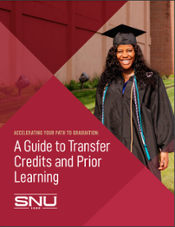-
Programs
Not Sure Where to Start?
- Associate Programs & Certificates
- General Studies
- Information Systems & Technology
- Physical Therapist Assistant
- Professional Services & Certificates
- View All
- Undergraduate Programs
- Business Administration
- Criminal Justice
- Cybersecurity
- Education
- Family Studies and Gerontology
- Healthcare Administration
- Organizational Leadership
- Accelerated General Education
- View All
- Resources
- Tuition & Aid
- Military

Introduction
In the 2018-2019 school year, 14 percent of public school students received special education services under the Individuals with Disabilities in Education Act (IDEA). Thanks to better testing, early intervention services, and increased awareness of the benefits of integrating special needs students into the classroom, the number of students requiring special education services has increased and will likely continue doing so.
A master’s in administration of special education prepares you to serve these students, their families, and the communities that they will grow up to join. This advanced degree offers a deep dive into the theory of learning disabilities, practical strategies to help students who require support, and significant leadership and management training. You will learn how to devise and structure an effective and inclusive curriculum. You’ll also gain the skills necessary to lead a special education team, advocate for students at the district level, and manage other educators.
This degree is an ideal choice for people who want to make an impact on the lives of students with learning differences, who believe in the power of inclusive education, and who want to earn a great living. This versatile degree opens doors to a variety of roles. You can climb the career ladder in your school district and beyond, or fill different roles across educational systems throughout your career. Here’s what you need to know about this master’s program—and how to decide if it’s right for you.
Download a PDF version of this guide by filling out this form, or keep scrolling to learn more.

Chapters
Benefits of Earning a Master’s in Administration of Special Education
Potential Career Paths with an M.A. in Administration of Special Education
Is an M.A. in Administration of Special Education Right for You?
Choosing the Right Career Path After Graduation
SNU’S Master’s in Administration of Special Education Program
- Benefits of Earning a Master’s in Administration of Special Education
- Potential Career Paths with an M.A. in Administration of Special Education
- Is an M.A. in Administration of Special Education Right for You?
- Choosing the Right Career Path After Graduation
- SNU’S Master’s in Administration of Special Education Program

Benefits of Earning a Master’s in Administration of Special Education
The industry is rapidly growing. Between 2011-12 and 2018-19, the number of students receiving special education services increased from 6.4 million to 7.1 million—growing from 13 to 14 percent of the public school population.
An M.A. in administration of special education (MAASE) offers a clear path into a lucrative and rewarding career. As the general population grows and awareness of special needs increases, the number of students requiring special education services will also likely increase. Capitalizing on this trend offers many benefits, including:
A less-competitive job market
As the need for special education experts increases, competition decreases. Schools need more support than ever, which means it will likely become progressively easier to get a job. In the 2019-2020 and 2020-2021 school years, many states reported a shortage of special education teachers across all exceptionalities.
Job security
Special needs students need support from preschool through high school and beyond. Schools cannot support them without the right team in place. As part of that team, you have significant job security if you do your job well.
A chance to help integrate special needs students into classroom settings.
More and more schools understand that students with atypical needs can thrive in traditional classroom settings. The majority (63.4 percent) of special needs students now spend most of their time in traditional classroom settings. That’s up from 31.7 percent in 1989. You can help these students adapt.
A chance to become a strong advocate
Special needs students need adults who can identify and advocate for their needs. If you have a strong voice, good communication skills, and a deep respect for people with diverse needs, a role in special education can be deeply satisfying.

The ability to make a difference
Special needs students face a wide range of obstacles, from identifying their needs to getting those needs met. You can make life with special needs a little easier, preparing these students to enter the world as happy, well-adjusted, and thoughtful adults.
Better pay
The specific amount you will earn depends on where you work, your career experience, the specific role you fill, and myriad other factors. Compared to bachelor’s degree recipients, however, master’s holders earn median annual earnings of $12,948 more. In some jobs, you can expect to earn well over six figures.
A chance to climb the career ladder
If you hope to one day lead a school or a special education team, a master’s degree may be a necessary prerequisite. With more education, you’ll unlock more career doors, helping you ascend faster and eventually earn more.
More job versatility
With a bachelor’s degree in education or special education, your opportunities may be limited to direct instruction. With a master’s degree, you can move out of educational settings, pursuing roles in nonprofits, as a consultant, and even in government.
The power to change the world
If you want to change the world around you, especially if you hope to create a more equitable world for those with different abilities, the work begins in childhood. Support special needs students to feel safer, more included, and better prepared to achieve for the rest of their lives. In so doing, you can help build a world in which people with a wide range of disabilities have more power and a stronger voice.
Resources

Potential Career Paths with an M.A. in Administration of Special Education
The world of special education is rich and diverse, with career paths suited to just about every disposition and ambition level.
A master’s degree can only expand your career possibilities, which means you’ll have a wide range of options well beyond those listed here. Here are some of the nine best career paths with your degree:
Special education director
With average annual salaries beginning just above $100,000, special education directors oversee services for special needs at the school or district level. They are administrators who must make numerous decisions and enforce district rules. You may develop budgets and apply for grants, design and implement new programs to serve the students in your district or school, and be accountable to school boards or administrators for the progress that students in your program make.
In most cases, you’ll work with collaborative teams across many departments. This requires strong management and leadership skills, as well as a commitment to advocating for the students you support. You may also speak on behalf of district programs, requiring strong communication and public relations skills.
Special education program coordinator
Special education program coordinators, who earn an average of $56,398 annually, lead special education teams at the school level. They may devise and implement curricula, support special education teachers, or split their time between teaching and administration. Many program coordinators work directly with students, talking to them about their experiences and tailoring school programs to meet the needs of families.
You’ll need excellent communication skills, the ability to form strong relationships with students, and an adaptable management style.
Special education instructional supervisor
A special education supervisor can expect average earnings of $76,835. Similar to program coordinators, they help design and implement special education programs and curricula. They also review programs to ensure they are compliant with district and legal guidelines, and they may advocate for students who need additional accommodations or support. They can also refer students to testing and therapeutic resources.
This job requires great advocacy and communication skills, strong relationships with students and their family, and a willingness to manage teachers and other staff as needed.

Special education principal
Principals, who have average earnings of around $100,000, play a key role in special education. They work with other administrators to design and approve special education curricula. They may also need to advocate for special needs students at the district level, and sometimes to legislatures and other governmental bodies.
As a principal, your job is to support all students and an entire faculty. This means you must be able to manage conflicts, oversee a team, and advocate for special needs students so that they do not get lost among typical students. A small number of schools specifically cater to students with special needs, and they hire principals with a strong background in special education.
Nonprofit leadership
Nonprofit organizations that advocate for or serve people with special needs know that a better life begins with a better education. They may hire or contract with special needs experts to develop new programs and policies, advocate on behalf of the population the nonprofit serves, or lobby at state legislatures. The potential roles—and salaries—vary widely. Some examples of nonprofit work include:
- Becoming a lobbyist for a special education organization
- Writing policy papers or grant applications
- Leading the special education department of a national nonprofit
Government agency leadership
A patchwork of federal, state, and local laws govern special education and the services that schools must provide. Government agencies need experts in special education to help them comply with these laws, better serve students and their families, and push for meaningful change. The specific salary and duties you might expect vary a lot depending on the agency where you work and the role you fill. Some duties you might have include:
- Drafting policy recommendations for a school board, governor, or legislator
- Running a state or local department of special education
- Consulting with government officials to educate them about the needs of special education students
Educational diagnostician
An educational diagnostician helps diagnose conditions that may affect education, including learning disabilities, developmental delays, and some mental health diagnoses. With average earnings of $68,000 annually, you will work directly with students and their parents to understand and address student needs. You may administer diagnostic tests, interview students about their classroom experiences, and work with families to identify reasonable accommodations that they can seek at school.

Behavioral intervention specialist
With average annual salaries of $44,246, behavioral intervention specialists help coordinate plans to better manage student behavior. Special needs students may struggle with behavioral issues, such as fidgeting, not paying attention, and acting out. Addressing their underlying needs often mitigates these behaviors. Even when it does not, the right classroom accommodations can help.
Behavioral intervention specialists work with a special education team to design strategies that better support special needs students in the classroom. They may partner with educational diagnosticians to better understand a student’s diagnosis, work with teachers to design support plans, and advocate for students at the school or district level. Sometimes they also work with parents to help them implement changes at home that can better support the student’s needs.
Special education teacher
Special education teachers are the first line of support for students with learning disabilities and other special needs. They have average annual earnings of $43,377, with significant variability depending on education, experience, location, and the specific student population they serve. You’ll implement special education plans, help integrate special needs students into the classroom, address behavioral and academic issues as they appear, and work closely with students and parents to ensure students get the quality education to which they are entitled.
A bachelor’s degree is the entry-level requirement in many districts, though schools and districts that offer higher pay may require a master’s. Even when they do not, a master’s degree can expand your skill set and empower you to climb the career ladder. You might start as a teacher, grow into leading a team, and eventually become an administrator or department director.

Is an M.A. in Administration of Special Education Right for You?
If the benefits of a career in special education sound good to you, it’s time to weigh whether this is the right career step.
Some questions to ask yourself include:
- Is this a good investment? Will my anticipated salary offset the cost of tuition? If so, how quickly? Will I be able to make student loan payments with my earnings?
- Do I want a leadership or administrative role in special education?
- Am I interested in special education and committed to advocating for students?
- Do I prefer working directly with students, or am I more interested in policy and planning?
- Is lack of education preventing me from pursuing the job I want?
- Could my degree help me earn more in my current role, or stay with my current employer but in a better role?
- Are there good jobs in special education in my area?
- Can I see myself working in this field for the rest of my life?

Choosing the Right Career Path After Graduation
One of the great things about a master’s degree is that it does not lock you into a specific role. Instead, you’ll get broad training that prepares you for myriad potential careers.
It’s a good idea to consider job options before you start, because this can help you choose the right classes and internships. Some factors to consider include:
Past work experience
What roles have you most enjoyed? At which jobs did you excel? Have you already accumulated experience in a specific field? For some special education teachers, a master’s degree is the only thing standing between them and a higher position in the educational hierarchy.
Interests
Although your prior experience is important, you deserve a career you’re passionate about. What interests you most in special education? Do you prefer working with students, or are you more invested in wonkish policy details?
Long-term career goals
The career from which you retire might be very different from the one in which you land right after graduation. Consider your end goals. Do you want to lead a school or district? Run for political office? Lobby for political change? Achieving these goals may depend on where your career begins.
Personal life goals
Everyone deserves a happy, meaningful life. What does that look like to you? Do you want to maximize earnings, spend more time with your family, retire early, make a difference in the lives of students, or some combination of all of the above? Research each career path to assess whether it will help you achieve your personal goals.

SNU’S Master’s in Administration of Special Education Program
An SNU master’s in administration of special education offers a balanced, diverse overview of the field that encourages students to think deeply and creatively.
-
Disability education courses, such as foundation/characteristics of mild/moderate disabilities and foundation/characteristics of severe-to-low incidence disabilities
-
Assessment, evaluation, and identification of exceptional individuals
-
Educational research
-
Academic instruction for inclusive students
-
Positive behavior support/management of students with disabilities
-
Special education law
-
Special education leadership and advocacy
Our innovative cohort model means you’ll learn with a group of peers, helping you nurture deep friendships and a meaningful professional network well before you graduate. Students take just one class at a time, empowering you to focus on the material without getting overwhelmed and distracted. This can mean better grades and a stronger understanding of course work. You choose where to learn. Commit to just one night a week of in-person instruction or a completely online model, tailoring your education to your needs and schedule.
Conclusion
No matter who you are, what you believe, or what career experiences you have had, SNU knows you have something valuable to offer the world. Our SNU community harnesses the power of each student’s unique gifts to help you live a life you’re proud of—one that makes a difference. We’re here to help you explore various career paths, no matter what you feel called to do. Apply now, or learn more about financial aid options here.
Download a PDF version of this guide by filling out the form













.jpg?width=920&height=480&name=The%20Greatest%20Obstacles%20to%20Graduation%20(And%20How%20to%20Overcome%20Them).jpg)
